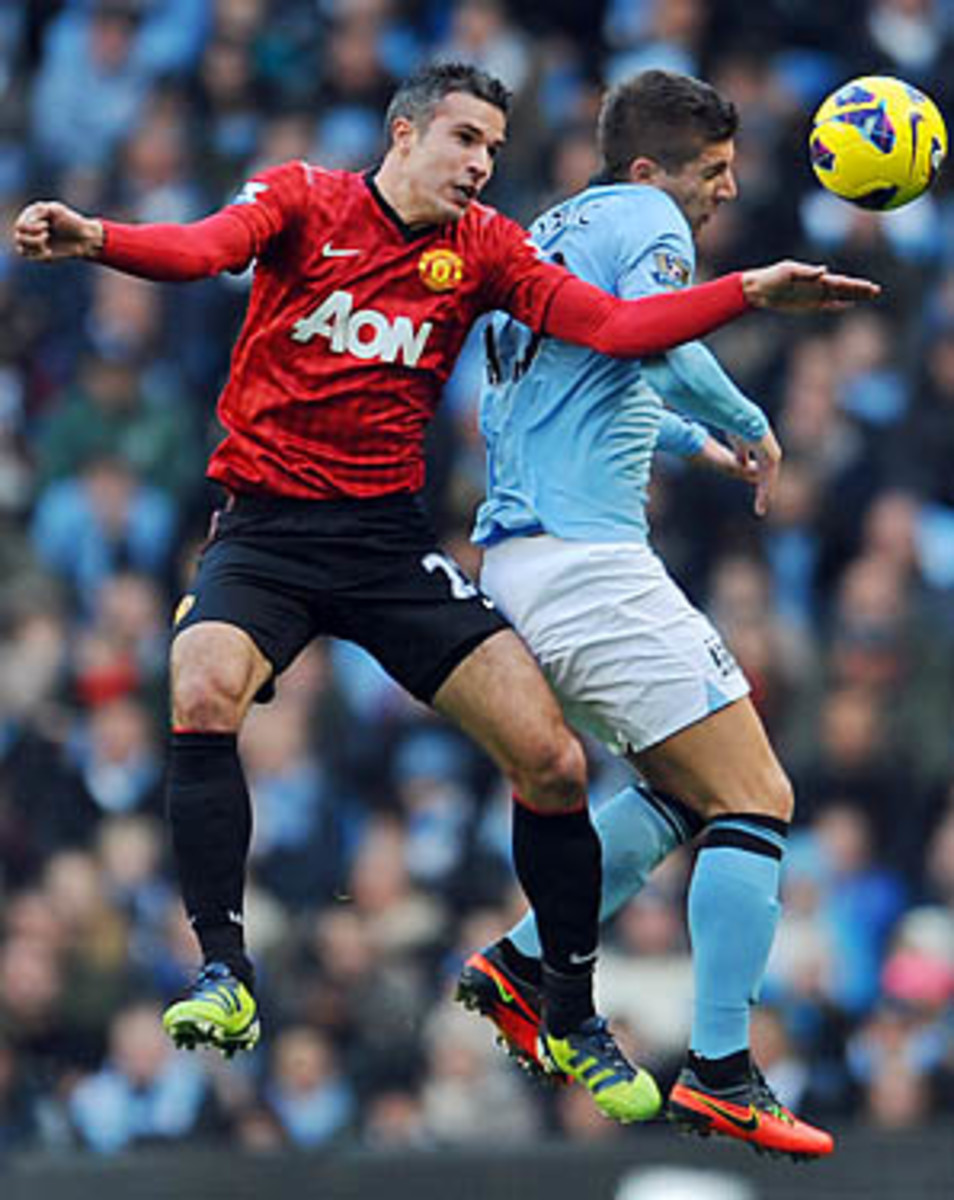
Derby shows what has changed in Manchester over last 6 months

Robin van Persie and Manchester United moved six points clear of Sergio Aguero and Manchester City.
Clint Hughes/AP
In April, Manchester City beat Manchester United 1-0 at the Etihad in a performance of such control it seemed as though the balance of power in English football might have taken a decisive shift in City's favor. It's always dangerous to place too much emphasis on one game, but so dominant was City, so moribund United, that it felt like looking at the future and the past: City was powerful and fresh; United, with three thirtysomethings in midfield and Ryan Giggs chugging back, looked merely a ghost of the team it had been four years earlier.
So what changed in six months? The truth is both teams have: United, while still deeply flawed, is a much better side than it was -- in part because of a couple of changes in personnel, one explicable by a signing, a couple more by injuries; while City, in its attempts to modify its style, is much, much worse.
When United signed Robin van Persie in the summer, the general consensus was that while he was a fine player, and a steal at £25 million, he wasn't the player United needed. What it was clearly lacking, what it is still clearly lacking, is a dynamic midfielder, the sort of player who can regain possession and add energy to midfield.
By signing Van Persie, though, United not only brought in one of the world's best goal scorers, but also ensured that Wayne Rooney could play deeper. Van Persie is mobile and, having played on both flanks and behind a front man in his time, can form a fluid front two with Rooney, but he can also lead the line, allow Rooney to go foraging for possession. That is what makes Rooney special: those who point out that his technique is not quite as honed as it perhaps ought to be for a player of his reputation or complain about his occasionally heavy first touch, are right, but they are missing the point, which is that Rooney is essentially an old-fashioned box-to-box midfielder in the guise of a No. 10 (who can also operate as a target man if required).
In April, Rooney had been stuck high up the pitch, waiting for the ball to come to him, which it did all too rarely. On Sunday, he did what he is best at, operating at the front of the midfield while making late surges that brought two goals. They were vital, clearly -- particularly the first as it arrived as City seemed in total control -- but almost as key was what happened in the first three minutes as Rooney committed two fouls. They were clumsy, yes, and the second one, on Yaya Toure, probably should have brought a booking -- but they also spoke of an intent, of the fact that Rooney and United weren't going to let City control midfield as they had in their last meeting.
Rooney's role, ultimately, proved decisive. With Samir Nasri and David Silva playing as narrow as usual, City might effectively have had an extra man in the midfield (Toure and Gareth Barry plus half a Nasri and half a Silva against Michael Carrick and Tom Cleverley). Rooney, by dropping deep, although not as deep as it had been rumored he might before the game -- and therein, of course, lies one of his great strengths; he has such a range of abilities that he can calibrate his position according to the match situation, was able to alleviate that shortfall, and that in turn meant that Nani and Luis Antonio Valencia could stay wide. Once United had the ball and could transfer it to the flanks, they were rampant.
The first goal came from a break down the left, the second as Rafael overloaded down the right -- David Silva, never great at tracking, was in no position to do so even if he had been minded to, and even the third resulted from Gael Clichy being caught in possession in the City left-back position.
Van Persie liberated Rooney, but United also benefited from having Valencia and Cleverley in the lineup, both of whom missed the game in April. Both offer energy, aggression and discipline as well as technical ability, and that enabled United to unsettle City as it hadn't back then. And this City team is ripe for being unsettled.
It was one of the enduring statistical oddities of this season that it remained unbeaten in the Premier League. It was asked why City struggled so much in the Champions League when it was flying domestically; the truth is merely that City had been exposed by the more exacting standards of its European group while getting away with it at home. A handful of individuals -- Sergio Aguero, Edin Dzeko and Toure (although even he hasn't been at his best this season) -- have got it out of trouble again and again.
Roberto Mancini has seemingly attempted this season to move City to a more possession-based approach, but it seems as far from finding an identity as ever. Matija Nastasic may be better on the ball than Joleon Lescott, but he has yet to form as solid a defensive partnership with Vincent Kompany, while the preference for Mario Balotelli over Carlos Tevez, who could have worked back as Rooney did and who changed the game after coming on six minutes to the second half, was baffling.
United still has defensive flaws, and City may yet click. Both teams conceded far too many goals early in games. Neither has really impressed yet this season. Both sides had spells of dominance on Sunday, and there remains a sense that City continues to handicap itself with odd team selections.
But United at least knows that the gulf that seemed to exist between the sides in April has disappeared.




